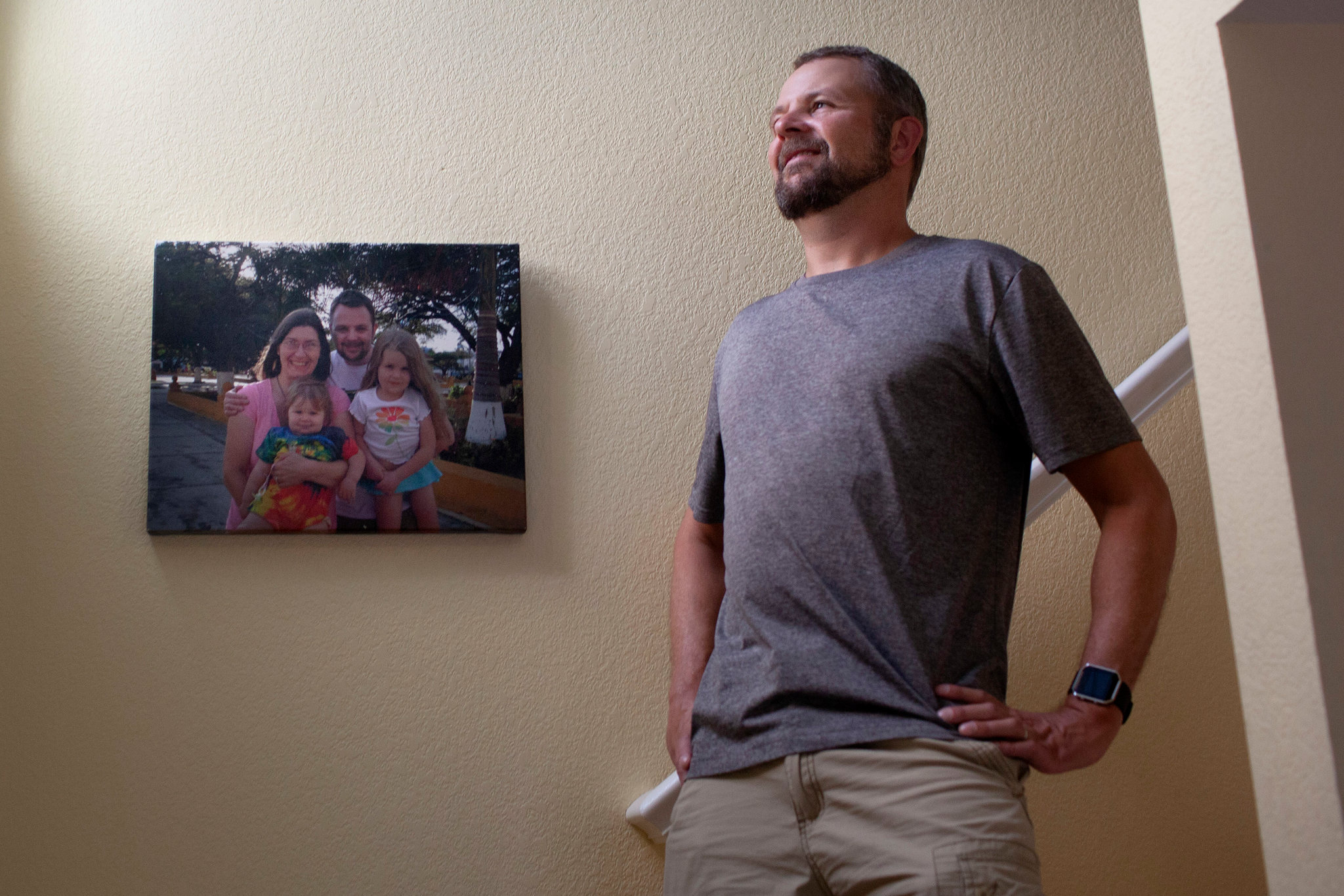How to retire to 40 years with a million dollars in a bank account
- Transfer
Having worn out with jobs that require too large loads, millennials are fired and join the FIRE movement.

Carl Jensen experienced what he calls “awakening,” around 2012.
He worked as a programmer in a Denver suburb, writing code for medical equipment. The work was intense: he had to document every step for the FDA , and an error in the code could harm or even kill the patient.
Jensen earned about $ 110,000 a year, he had a certain social package, but it seemed that all this did not pay off the stress. He could not relax with his family after work; it happened that he spent whole days hugging the toilet. He lost 5 kg.
After one particularly brutal day at work, Jensen googled the question “how do I retire early?” And his eyes opened. He consulted with his wife and made a plan: for the next five years they saved a significant part of their income, seriously cut expenses until they collected about $ 1.2 million.
On Tuesday, March 10, 2017, Jensen called his boss and warned about his dismissal after 15 years of work in the company. However, he did not quit, but retired. He was 43.
Break the path to retire
And although the story of Jensen may seem to be an exceptional, more modest version of a stockbroker's tale that successfully earned money on Wall Street and sailed on his yacht towards the Caribbean islands, in fact it is an example of a growing movement of young professionals, deliberately concentrating on forever part with their work.
Especially this movement with the abbreviation FIRE (financial independence, retire early) [financial independence and early retirement] fell in love with the millennials - they see this as a way to escape from exhausting the soul and stealing their work time and the consumer economy.
FIRE followers are usually men working in the technology industry, left-brain engineers, botanists counting compound interest over 40 years, or comparing returns to investments from mutual funds with real estate profits.
Most of the controversy over the goings on the Reddit forums or on blogs like Mr. Money Mustache revolves around “hacking” finances: strategies to increase the percentage of funds that a person can save for the future, to the sacred goal of 70%, tips on low-cost travel using airline bonus cards, ways to save some money in grocery stores.
Some practice extreme frugality, others lean toward a more typical standard of living combined with savings and investment, someone chooses the FIRE barista method (part-time work at Starbucks after retirement, as a way to use the company's health insurance). To participate in the movement means to cut expenses to maximize savings, increasing investments to amounts that can support you.
“Many people consider us new hippies,” said Jensen, who sold his four-bedroom and four-bathroom home to move to a more modest home, and fully retirement savings. "They can't even understand it."

Carl Jensen

Carl Jensen with his daughter Daphnia and wife Mindy in Longmont, Colorado.
In retirement, Jensen, with his wife and two daughters, plans to live on about $ 40,000 a year from investment. His wife is still working, and they have yet to use these accounts. But their life already gives them a lot of free time and a little luxury: they buy products at Costco [the world's largest network of self-service warehouses], and he repairs the car and the house himself.
“People usually assume some kind of external intervention: Oh, you probably got a legacy,” said Jensen. - But we just decided to live much more modest than we can. And this idea itself is radical. ”
Also, the idea of resigning from work after 30 or immediately after 40 years sounds radically, at a time when people usually actively pursue a career, or, less pleasantly, they endure a daily routine to pay bills, waiting for them to pay social insurance. .
Jason Long , who worked as a pharmacist in a rural area in Tennessee, who retired last year in the prime of his 38 years old, said his father had a hard time understanding why Long could not continue to work and get his $ 150,000 salary.
But Long said that he didn’t like his work, where he watched the cost of drugs rise dramatically, sick people fought with insurance companies and suffered from an excessive amount of opiates prescribed for them, which was disastrous. And his clients - angry, entangled, barely making ends meet, often broke off at the man behind the counter.
“There were days when I had to stand at the counter for 12-14 hours, without leaving the bathroom, without dining, all because of the huge amount of work,” said Long. Like Jensen, in the last ten years, he put aside a fairly substantial part of his income, he and his wife lived in a fully paid house and accumulated an investment portfolio worth a little more than a million dollars. So why was it necessary to continue working?
“All the calculations are in front of my eyes,” said Long. - It does not make sense to go to work, because of which I felt unhappy, if there is no need to fill a bank account. "
How much do these millennials hate work
The concept of exit from the "rat race" is not new. From the 18th century shakers to the hipsters of the 1960s and 70s returning back to nature, some Americans have always wanted to make life easier. One of the bibles of the FIRE movement, the book “ Trick or Treat ”, which teaches the reader to reduce costs and value his time (or “life energy”) above material profit, was published in 1992.
But Vicky Robin, who wrote this financial statement with Joe Dominguez, says that the FIRE crowd is different from those renegades that existed in the 90s. “Our goal was not just to get a bunch of people out of work,” said Robin. - Our goal is to reduce consumption and save the planet. We attracted people who live simply, religious people and those who care about the environment. ”
At the same time, people from FIRE, on the contrary, “are very focused on numbers, and are very interested in the details of taxation and accounting,” said Robin.
They also receive their dividends from the long bull market trends, and in some cases, from the privileges of a particular class, race, gender, and inheritance. It’s quite difficult to retire at 40 if you work at work with a minimum wage, or a giant college debt weighs on you, or you didn’t have the same opportunities as other people because you grew up in a poor criminal area.

Carl Jensen
But if, as Robin says, FIRE supporters do not have their ideals inherent in previous generations, why do they want so much to leave work? Many millennials have not worked for even ten years.
Robin says it's all about finding meaning. “A person working in such an economy practically does not control his own life. All people are replaceable. When you are young, you look to the future and ask yourself: “What is waiting for me there?”
This well describes the feelings of Kristie Shen and Bryce Lang. This couple from Toronto gained a certain fame (and became the goal of Internet haters ), having left work in technology companies in 2015, so that without stopping to travel around the world. At that time they were a little over 30.
The insight came to Shen, when in front of her eyes an IT colleague lost consciousness in the workplace, working 14 hours a day, and he had to be taken away in an ambulance. A few years before, he and Lang, following in the footsteps of their parents, tried to buy a house in Toronto, where real estate prices had been rising for a long time and actively.
But, as Shen says, “it didn't matter how much you put off - this goal was constantly moving away from you. And I watched as people climb out of their skin trying to pay the mortgage. ”
Although they had a good education and well-paid job in a thriving technology sector, Shen and Leng faced imminent threats of outsourcing and artificial intelligence, they had no hope of retirement, or even their employers in five years.
At the same time, their work absorbed all their time, they worked almost around the clock. And instead of tying themselves to expensive mortgages and too hard work, they decided to invest in an investment portfolio and relax.
“The parents gave us a set of life rules that worked perfectly in the 1970s,” said Shen. “But we had to throw away this instruction and write a new one.”
Leng talked more directly about the problems his generation was facing. “We have no jobs that can take care of us,” he said. “We have to take care of ourselves on our own.”
Move to a cheap place
Rejecting the big city, Shen and Leng give another example of the popularity of FIRE: the high cost of city life, especially in places like New York or Southern California. It is characterized by the insane value of real estate, expensive child care and the temptations of the so-called “lifestyle”.
“We gave almost $ 3,000 for renting an apartment, and we thought it was still a good option,” said Scott Rickens, 35, who, with his wife Taylor, was 33 years old and a little daughter lived in Coronado, pc. California, in an expensive beach town on the other side of the bay from San Diego. "Together we earned about $ 160,000 a year, but of this amount, there was little left."
Hearing a podcast with an interview with the blog host Mr. Money Mustache, Pete Adeni, whom The New Yorker magazine called "economy guru, "Rickens imbued with the topic. He told his wife that they should abandon the BMW leasing and stop eating in restaurants several times a week.
But with such savings, the family could not increase the amount of money put aside cheap terrain is a debt reduction process that people at FIRE get together are called “arbitrage.”
The idea, as Edeny explains, is to “reap the benefits of high wages” somewhere in Silicon Valley, “and then take these savings by moving to one of thousands of sweethearts and The availability of small towns in our country, and to initiate the second phase of life on their own terms. "

Scott and Taylor Rikins, moved from California to Oregon
Mrs. Rickens, who works in recruiting, at first did not want to part with BMW, life at sea, and all the prestige that was associated with this, until she came across the pension calculator, which suggested that they could retire after 10 years, and if they do not give up the current standard of living, then at 90.
“I never paid attention to finances, I thought that everything would work out by itself,” said Rickens. “After the birth of the child, I was worried about whether I could give her time. I was a slave to my work because of our lifestyle. ”
Last year, the couple left Southern California in search of a place of residence where they would feel more financial freedom. Rickens, the former creative director of a creative agency, describes this journey on the documentary blog Games with FIRE"
As a result, they settled in Bend, Oregon, where there is no sales tax, and where they could afford to buy a house. A liter of gas for their Honda CRV with a mileage of 300,000 km (they sold BMW and use one car for two ) costs a quarter of a dollar cheaper than in San Diego, although Rickens often rides a bicycle in the city.
"The very theme of early retirement is not very important for me. It is more important for me to gain control over my own time," Rickens said - If you delve into the definition of a pension, then in fact we are entering a penny yu, refusing compulsory labor. This does not necessarily mean Popivanov cocktail on the beach. "
Retire before parents
Retirement to gray hair, and a pension lasting 40, 50 or even 60 years, in modern society is perceived as something abnormal. What is to fill all these days, months and decades?
Recently, on a weekday, Jensen led his 8 and 11 year old daughters to the Boulder County Fair. “I told them: We will wait until Thursday, when there will be 50% discounts,” he said, “and by the way, we will go there on foot.” She is two miles from home. ”
Fearing boredom, Jensen first took on too much, and at first it seemed strange to him that he was working out in the gym with the elderly, or shopping in an empty store on Thursday. He also retired before his mother, which allowed them to hold awkward family gatherings.
But after spending a year like this, he adapted to a relaxed life, enjoying raising his daughters, doing everything so that they would not see him as a vegetable, staring at TV. Jenson is also committed to being a kind of golfing option among FIRE fans: he maintains a blog with financial advice.
Among other retirees from FIRE who started a blog is Early Retirement Dude ; husband and wife with Our Next Life project ; a family couple project with the children of Frugalwoods , who wrote a book about how they turned from well-earned Boston suburb residents to retiring Vermont settlers; Shen and Leng, who in their free time from traveling around the world call everyone toMillennial revolutions (“stop working, start living”).
It is not surprising that a technically savvy generation preaches on the Internet. In addition, blogging can give you the holy grail of early retirement - an additional source of income.

Rickens at Home
Perhaps Long, a pharmacist from Tennessee, described the condition of the person who retired in more detail. In several posts on the forum on financial independence, he with restrained humor and self-deprecation described his first year in retirement.
After a month of living according to the canons of FIRE, he wrote about the feeling of guilt for spending money on video games, and the fear of exceeding his budget. He spent his days with his family, in the gym, working at home, doing physical exercises. So far he has no regrets: “I made the right decision. This is life. ”
In the second month, Long wrote that in the first two months his portfolio grew by 2.8%, even after living expenses, and described his achievements, including an increase in the number of books read, cooking, working as a volunteer and “reducing the time to build Rubik's Cube. He wrote about reducing the level of tension: "My friend told me that an expression of horror had disappeared from my face."
In the following months, he revised the series “Roots”, lost interest in discussing FIRE goals after reaching them, was frightened by the impending collapse of markets, complained about nightmares in which he “works in the office again and argues with idiots”, ran a marathon in less than three hours, setting a personal record, sometimes felt isolated from society, made a two-week trip crossing the entire country, twice went to the beach in Florida with his wife, watched the increase in his portfolio, despite the fact that he did not work.
And he began to blog.
“My life now is much better than what it was,” Long wrote seven months later. “I hope that all my readers will achieve the same peace.”
On the phone, Long admitted that he may have just burned out at work, and that the whole FIRE movement was just a necessary break before he found a more satisfying career for himself. And when he was recently offered to work again in the pharmaceutical field, he experienced a slight fit of horror.
That morning he woke up by himself, “not when the alarm clock informed me about my duties.” I read the news on the Internet for half an hour, ran 11 km, slept, "watched the ceiling fan a little”.
He occasionally watches movies from the list of the site They Shoot Pictures, Don't They? entitled "The Best 1000 Movies of All Time." He has already watched about 600 films. So he still has something to do.
